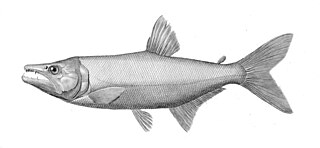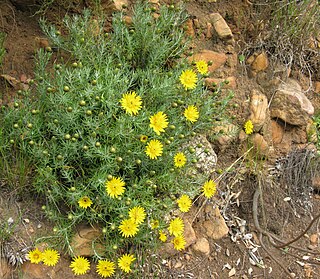
Balitoridae, the hillstream loaches or river loaches, is a family, of small fish from South, Southeast and East Asia. The family includes about 202 species. They are sometimes sold as "lizardfish" or "flossensaugers". Many of the species are popular for aquaria, species in the genus Sewellia are most commonly sold in the aquaria trade. They have a number of similarities with the Cobitidae, their sibling family of "loaches", such as multiple barbels around the mouth. They should not be confused with the loricariids, which look similar but are a family of catfish.

Acestrorhynchus is a genus of characiform fish found only in fresh water in South America, the sole genus in the family Acestrorhynchidae. Their greatest diversity is in the Orinoco and Amazon basins.
The longfin escolar, Scombrolabrax heterolepis, also known as the black mackerel, is a widespread but uncommon deep sea ray-finned fish that presents some difficulties for taxonomy.

Sporobolus heterolepis, commonly known as prairie dropseed, is a species of prairie grass native to the tallgrass and mixed grass prairies of central North America from Texas to southern Canada. It is also found further east, to the Atlantic coast of the United States and Canada, but is much less common beyond the Great Plains and is restricted to specialized habitats. It is found in 27 states and four Canadian provinces.

The Cichorioideae are a subfamily of the family Asteraceae of flowering plants. Familiar members of Cichorioideae include lettuce, dandelions, chicory and Gazania species. The subfamily comprises about 240 genera and about 2900 species. It is heterogeneous and hard to characterize except with molecular characters.
Eurynotoides is an extinct genus of prehistoric bony fish in the family Eurynotoididae of the order Eurynotoidiformes.

Heterolepis is a genus of flowering plants in the sunflower family. It has three or four species, all endemic to the Western Cape Province in South Africa.

The blacknose shiner is a species of fish belonging to the family Leuciscidae.

Homalopterula gymnogaster is a species of ray-finned fish in the genus Homalopterula. It is commonly found in freshwater lakes Maninjau in West Sumatra, Indonesia.
Homalopterula ripleyi is a species of ray-finned fish in the genus Homalopterula.
Homalopterula vanderbilti is a species of ray-finned fish in the genus Homalopterula.
The Microlophus heterolepis is a species of lava lizard endemic to Chile and Peru.

Brachirus is a genus of small and medium-sized soles. Most are native to marine and brackish waters in the Indo-Pacific, but several species can also be seen freshwater in southern Asia, Eastern Africa, New Guinea and Australia.

Homalopterula is a genus of freshwater ray-finned fishes belonging to the family Balitoridae, the loaches in this family are commonly known as hillstream loaches although this name also refers to the loaches in the family Gastromyzontidae. These loaches are found only in Sumatra in Indonesia.

Pogoneleotris heterolepis is a species of fish in the family Butidae endemic to the marine and brackish waters of Malaysia. This species is the only known member of its genus.

Panna is a genus of marine ray-finned fish belonging to the family Sciaenidae, the drums and croakers. These fishes are found in southern and southeast Asia.

Acestrorhynchus heterolepis is a species of fish in the family Acestrorhynchidae. It was described by Edward Drinker Cope in 1878, originally under the genus Xiphorhamphus. It inhabits the Amazon, Negro and Orinoco Rivers. It reaches a maximum standard length of 40.8 cm (16.1 in).

Enyalioides heterolepis,
Sceloporus heterolepis, the dorsalkeel spiny lizard or southern odd-scaled lizard, is a species of lizard in the family Phrynosomatidae. It is endemic to Mexico.












